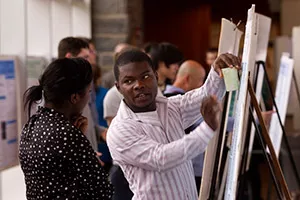Honors Examinations Embody Swarthmore Experience

Sara Fitzpatrick '14 was two weeks from graduating, but it may as well have been two months. She still faced a slog of Honors examinations on international security, international political economy, social psychology, and ancient political theory.
The written examinations were one thing - she could prepare for them by reviewing questions from past years. But the oral examinations, which meant meeting face to face with an outside examiner, were "more of a mystery."
"You don't really know what your examiner is going to be like be like or how they'll approach the process," says Fitzpatrick, a political science major from Agat, Guam. "One of the examiners really challenged my answers and expected me to challenge her back, while another just wanted to discuss my favorite theories."
The only undergraduate program of its kind in the U.S., the Honors Program is modeled on the tutorial system at Oxford University, where Swarthmore's seventh president, Frank Aydelotte, was a Rhodes Scholar. Since 1922, the program has embodied the College's commitment to dedicated learning and the life of the mind.
This year, 81 senior Honors students - just under a quarter of the Class of 2014 - participated in 165 examinations on a vast array of topics. An eclectic group of 131 outside examiners evaluated the students' written and oral examinations before deciding through a caucus to bestow highest honors, high honors, or honors. The idea is that students should be able to discuss their fields of interest with any expert in the world.
"You need to challenge yourself if you want to be good at what you do," says Bruce Maxwell '91, professor of computer science at Colby College who had previously taught at Swarthmore. "Being able to convince an outside examiner that you deserve the honors makes them meaningful and should be a source of pride."
This year's head examiner, Vicki Mahaffey, professor of English and gender and women's studies at the University of Illinois, Urbana-Champaign, says the external examiners "heighten the objectivity of the examinations process."
"They also make it clearer that [the student's Swarthmore professor] is a kind of coach, who is invested in the student's success," she says. "Being examined by someone outside the system, then, is the equivalent of running the race for which the student has been coached."
That approach reflects the College's confidence in "the Swarthmore experience," says Jayanti Owens '06, professor of population health sciences at the University of Wisconsin-Madison (whose perspective came full circle last week when she served as examiner for a seminar of Associate Professor of Political Science Keith Reeves '88 that she had taken as a student here).
"That Swarthmore has such confidence in its students and invests so many resources in the Honors program is, I think, a testament to the College's vision of producing movers and shakers who are thoughtful, reflective, and deeply engaged with multiple viewpoints and perspectives on any given issue," she says.
Before the oral examinations began, however, many students found them daunting.
"It's one thing to memorize and pour out details for a semester exam," says Imoleayo Abel, a computer science and engineering major from Lagos, Nigeria, "another to answer questions posed by an external examiner who only has an idea of what but now how you were taught."
"The professors would intentionally question me on material I didn't know as well," adds Collin Smith, a political science major from New Hope, Pa. "So while [the oral exams] were more relaxed and conversational, I was still on my toes the entire time."
Once the exams were behind them, however, the students appreciated their value.
"All of them made me think about concepts or viewpoints I had never explored," says Noah Sterngold, an economics and engineering major from Muncy, Pa. "It was great to finally not just see but hear and discuss a completely fresh perspective on many of the topics I've studied at Swarthmore."
"The examiners were invested in our thought processes, our opinions, the problems with which we wrestled," says Caroline Batten, an English literature major from West Newton, Mass. "It was genuinely validating."
Reflecting on the Honors process as a whole, Madeline Charne says it taught her that she could push herself to new limits.
"I can work for weeks on end without a break, I can write a huge thesis project, and I can talk with experts in my field without feeling intimidated or out of my depth," says Charne, a theater and English literature major from New York, N.Y. "I'll take these discoveries about myself with me into the next things I choose to do."



